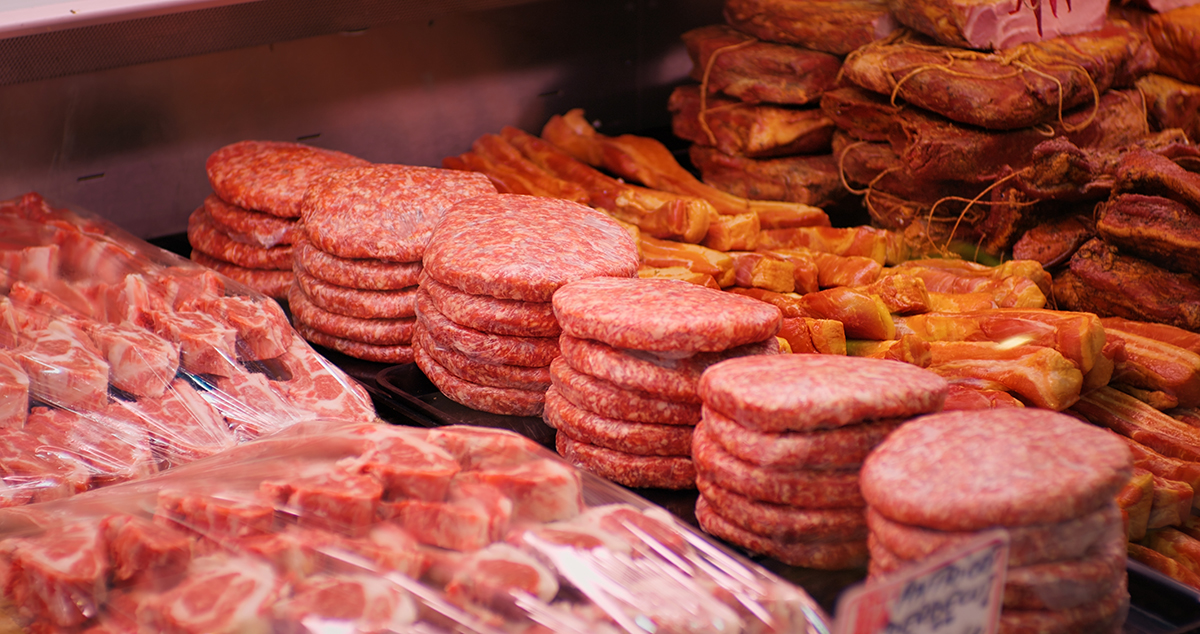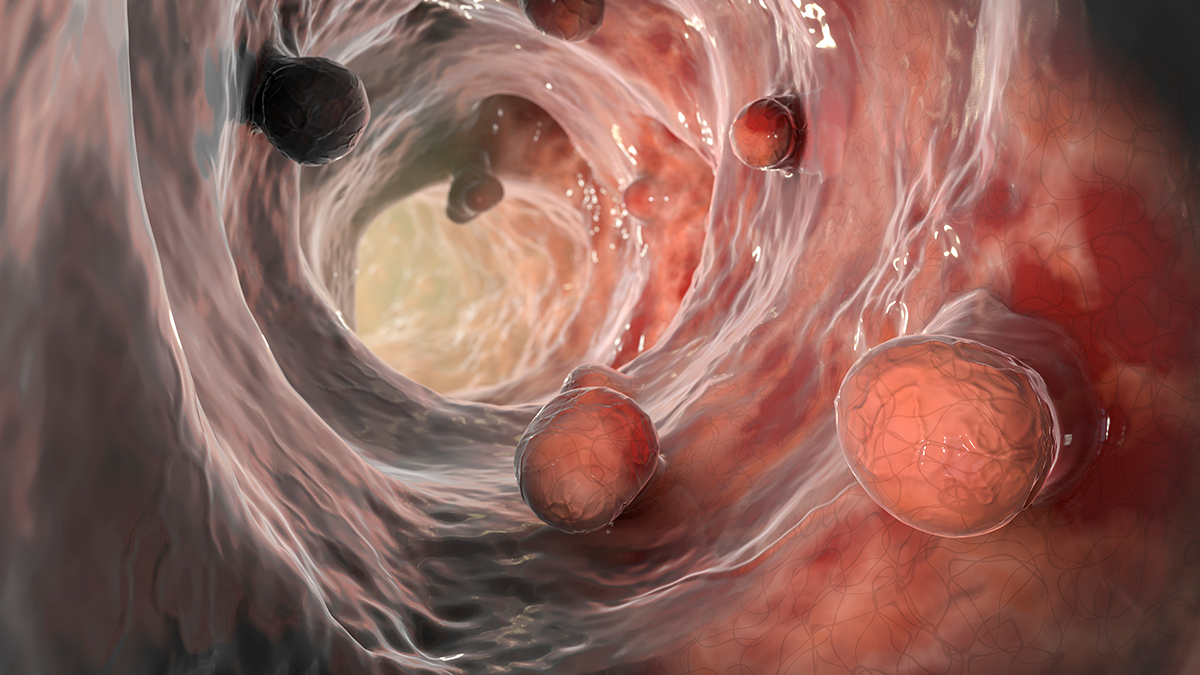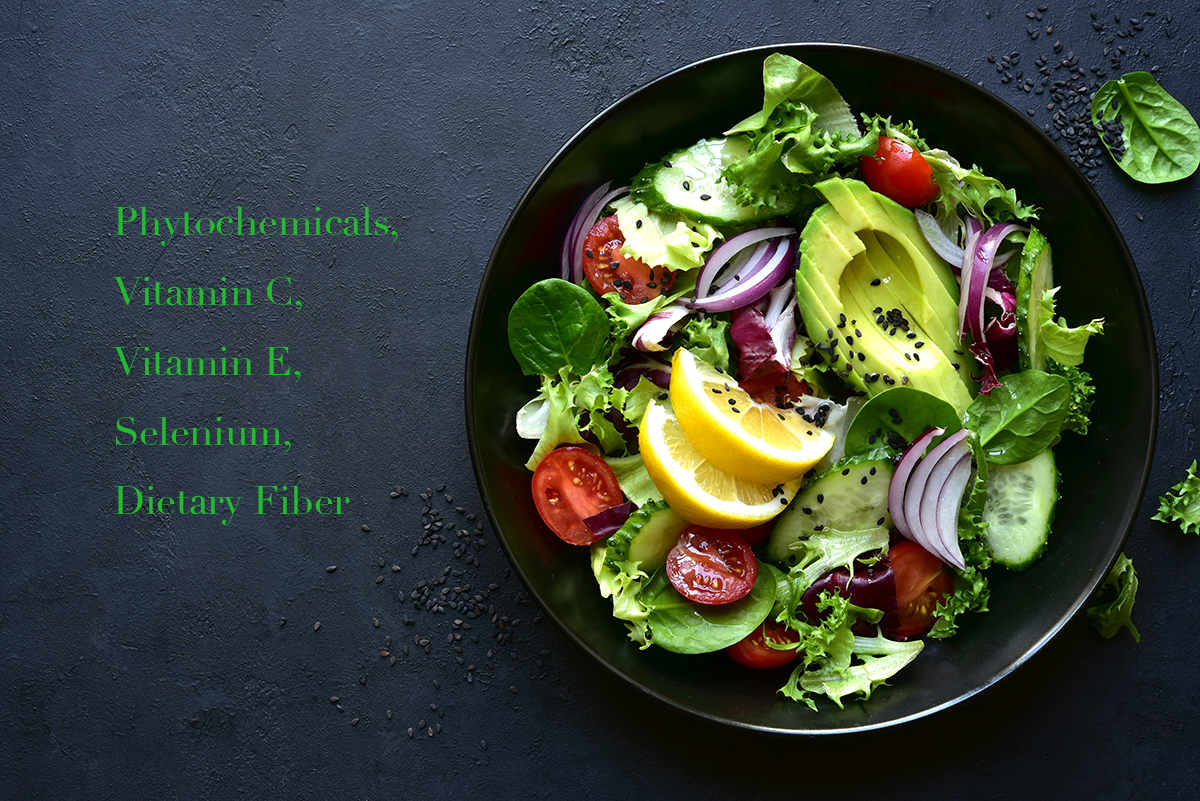——消化器ガンの発生要因と予防への栄養的アプローチ
⑴ 消化器ガンと食生活の関係
消化管は外界と直接接している臓器であり、摂取した食物が直接的・間接的にガンのリスクに影響を及ぼします。
胃ガン、大腸ガン、食道ガン、膵ガン、肝ガンなどの消化器ガンは、喫煙や飲酒、感染症(ピロリ菌、B型・C型肝炎ウイルスなど)に加えて、食生活の質とも深く関係しています。[1]

特に、加工肉や赤肉の過剰摂取、野菜や食物繊維の不足、精製炭水化物やトランス脂肪酸の多い食事は、大腸ガンのリスクを上昇させることが報告されています。[2・3]
また、胃ガンにおいては、塩分の摂りすぎや保存食品、燻製食品の過剰摂取がリスク因子として知られています。[4]

Bowel polyps, colorectal polyps, 3D illustration showing numerous polypous protrusions on the on the lining of the intestine
⑵ 腸内環境と発ガンのメカニズム
腸内細菌叢のバランスの乱れ(ディスバイオーシス)は、発ガンの重要な要因の一つです。
腸内で有害物質(発ガン物質)を産生する細菌が増加したり、有害代謝物が蓄積したりすることで、腸管上皮細胞の炎症や遺伝子損傷が誘発される可能性があります。[5]
たとえば、大腸ガン患者では、Fusobacterium nucleatum という炎症性細菌の増加が観察されており、これはガンの進行や転移と関連しているとされています。[6]
また、胆汁酸の二次代謝産物(例:デオキシコール酸)は、高脂肪食によって増加し、腸管粘膜を損傷しやすく、発ガン性をもつと考えられています。[7]

⑶ 栄養療法によるガン予防と管理
植物由来の抗酸化物質(ファイトケミカル)やビタミンC、ビタミンE、セレン、食物繊維などは、消化管における発ガンリスクを低減するとされています。
これらは細胞の酸化ストレスを軽減し、炎症やDNA損傷を防ぐ作用があります。[8]
さらに、発酵食品や水溶性食物繊維(イヌリン、ペクチンなど)は、腸内環境を整えることで、有害菌の増殖を抑制し、短鎖脂肪酸(SCFA)の産生を促します。
SCFAの一種である酪酸(ブチレート)は、大腸上皮細胞の分化とアポトーシスを誘導し、ガン予防に寄与する可能性があります。[9]
このように、ガンの予防には、栄養バランスのとれた食生活と腸内環境の最適化が不可欠です。
過剰な炎症や酸化を抑え、発ガンの引き金となる因子を減らす食事戦略が、栄養療法の中心に据えられつつあります。

References
- World Cancer Research Fund/American Institute for Cancer Research. (2018). Diet, Nutrition, Physical Activity and Cancer: a Global Perspective.
- Bouvard, V., et al. (2015). “Carcinogenicity of consumption of red and processed meat.” The Lancet Oncology, 16(16), 1599–1600.
- Aune, D., et al. (2011). “Dietary fibre, whole grains and risk of colorectal cancer: systematic review and dose-response meta-analysis of prospective studies.” BMJ, 343, d6617.
- Tsugane, S. (2005). “Salt, salted food intake, and risk of gastric cancer: epidemiologic evidence.” Cancer Sci, 96(1), 1–6.
- Schwabe, R. F., & Jobin, C. (2013). “The microbiome and cancer.” Nature Reviews Cancer, 13(11), 800–812.
- Kostic, A. D., et al. (2013). “Fusobacterium nucleatum potentiates intestinal tumorigenesis and modulates the tumor-immune microenvironment.” Cell Host & Microbe, 14(2), 207–215.
- Bernstein, H., et al. (2005). “Bile acids as carcinogens in human gastrointestinal cancers.” Mutation Research, 589(1), 47–65.
- Slavin, J. L. (2000). “Mechanisms for the impact of whole grain foods on cancer risk.” J Am Coll Nutr, 19(3 Suppl), 300S–307S.
- Louis, P., et al. (2014). “The gut microbiota, bacterial metabolites and colorectal cancer.” Nature Reviews Microbiology, 12(10), 661–672.




 トップへ戻る
トップへ戻る